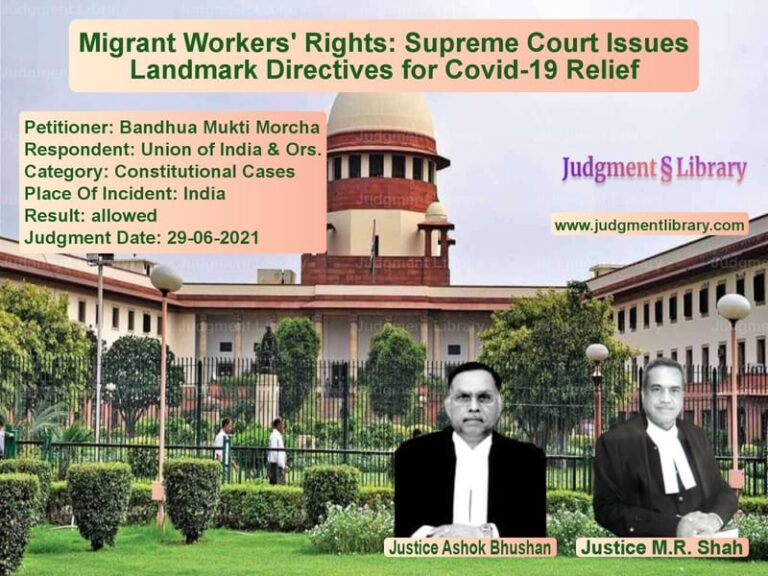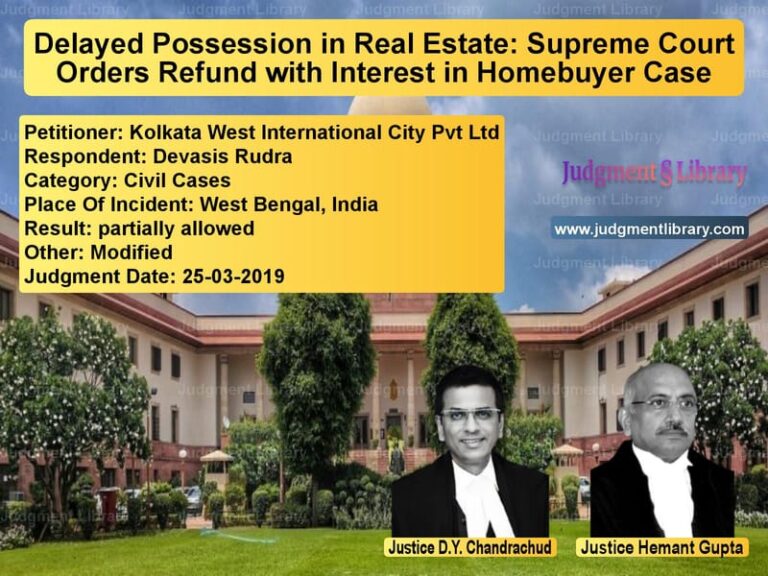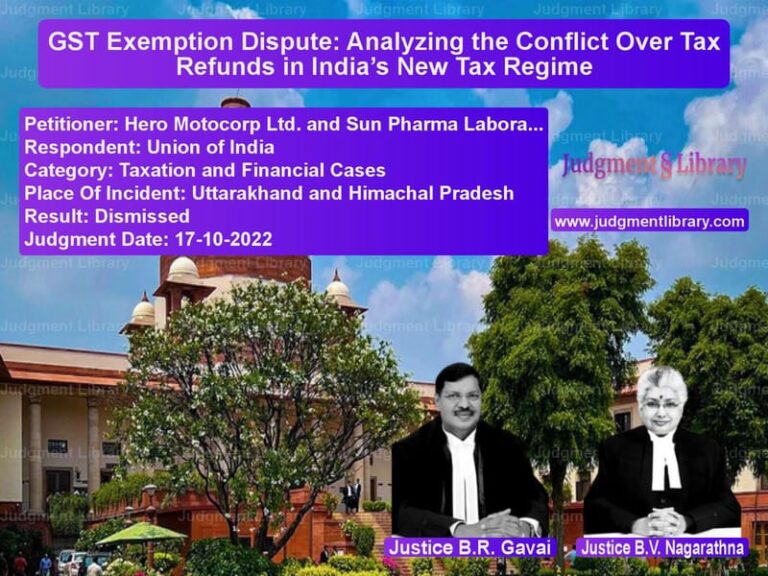Anticipatory Bail and Trial Court’s Authority: Supreme Court’s Ruling in Criminal Appeal
The case of Prakash Chand Meena vs. State of Rajasthan & Another is a significant ruling regarding the interplay between anticipatory bail under Section 438 of the Code of Criminal Procedure (CrPC) and the authority of the trial court to grant regular bail. The Supreme Court of India, in its judgment on October 9, 2018, examined whether an order granting anticipatory bail by the Supreme Court automatically influences the trial court’s decision to grant regular bail.
The ruling clarifies an important legal question—whether the trial court can grant regular bail solely on the basis of a prior Supreme Court order granting anticipatory bail. The judgment also provides guidance on when and how conditions on bail may be modified by trial courts.
Background of the Case
The case arose from an FIR No. 202 dated October 5, 2017, registered at Police Station Banipark, District Jaipur (West), Rajasthan, against the appellant, Prakash Chand Meena. The appellant sought anticipatory bail under Section 438 CrPC, which was initially denied by the High Court. Subsequently, the appellant approached the Supreme Court for relief.
Arguments by the Appellant (Prakash Chand Meena)
The appellant contended that:
- He had been falsely implicated in the case and feared arrest.
- There was no prima facie evidence against him to warrant custodial interrogation.
- Since he was willing to cooperate with the investigation, he should be granted protection from arrest.
- He was ready to abide by any conditions imposed by the court.
Arguments by the Respondent (State of Rajasthan)
The State of Rajasthan opposed the anticipatory bail, arguing that:
- The nature of allegations required custodial interrogation.
- The accused could influence witnesses if released.
- Granting anticipatory bail might hinder a fair investigation.
Supreme Court’s Initial Order on Anticipatory Bail
The Supreme Court, on January 23, 2018, granted interim protection to the appellant, stating:
“In the event of the petitioner being arrested in connection with FIR No. 202 dated 05.10.2017 registered at Police Station Banipark, District Jaipur (West), he shall be released on execution of bond for a sum of Rs. 1,00,000/- (Rupees One Lakh) with two solvent sureties for the like amount. We make it clear that this order is passed subject to other conditions under Section 438(2) of the Cr.P.C. and the petitioner shall cooperate with the investigation.”
This order allowed the appellant to avoid immediate arrest while directing him to abide by the CrPC conditions and cooperate in the investigation.
Trial Court’s Grant of Regular Bail
Following the Supreme Court’s order, the investigation was completed, and the final charge sheet was filed. The trial court, on February 15, 2018, granted regular bail to the appellant, primarily relying on the fact that the Supreme Court had earlier granted him anticipatory bail.
Supreme Court’s Final Judgment
The Supreme Court examined whether the trial court could have granted regular bail merely because the appellant had been granted anticipatory bail earlier.
Key Observations of the Court
- The trial court granted regular bail without conducting an independent assessment of the case.
- It merely relied on the Supreme Court’s earlier anticipatory bail order, which was meant for interim protection, not for granting regular bail.
- The order dated February 15, 2018, did not contain any other consideration or reasoning apart from the fact that anticipatory bail had been granted.
The Court ruled:
“Since the matter is referred to a larger Bench, we do not propose to deal with the issue any further as to whether the Trial Court could have granted regular bail solely based on the protection granted by this Court.”
Directions Issued by the Supreme Court
- The trial court’s order granting regular bail was not set aside, but the complainant was given the right to approach the trial court for modification of bail conditions.
- The complainant was permitted to move an application before the trial court seeking stricter conditions on bail.
- The Supreme Court refused to pass any order requiring the appellant to deposit an additional amount before the trial court.
- The complainant was given the liberty to pursue further remedies before the appropriate forum.
Impact of the Judgment
The judgment has important implications for bail jurisprudence in India:
- It clarifies that anticipatory bail does not automatically lead to regular bail.
- The trial court must apply its mind independently while considering a regular bail application.
- The complainant has the right to seek modification of bail conditions, ensuring that accused persons do not misuse interim relief.
Conclusion
The Supreme Court’s decision in Prakash Chand Meena vs. State of Rajasthan provides crucial guidance on the legal distinction between anticipatory and regular bail. It reaffirms that trial courts must exercise independent discretion while granting bail and not rely solely on prior interim protection orders. The ruling ensures that the criminal justice system maintains a balance between the rights of the accused and the interests of justice.
Petitioner Name: Prakash Chand Meena.Respondent Name: State of Rajasthan & Another.Judgment By: Justice Kurian Joseph, Justice S. Abdul Nazeer.Place Of Incident: Rajasthan.Judgment Date: 09-10-2018.
Don’t miss out on the full details! Download the complete judgment in PDF format below and gain valuable insights instantly!
Download Judgment: Prakash Chand Meena vs State of Rajasthan & Supreme Court of India Judgment Dated 09-10-2018.pdf
Direct Downlaod Judgment: Direct downlaod this Judgment
See all petitions in Bail and Anticipatory Bail
See all petitions in Judgment by Kurian Joseph
See all petitions in Judgment by S. Abdul Nazeer
See all petitions in partially allowed
See all petitions in Modified
See all petitions in supreme court of India judgments October 2018
See all petitions in 2018 judgments
See all posts in Criminal Cases Category
See all allowed petitions in Criminal Cases Category
See all Dismissed petitions in Criminal Cases Category
See all partially allowed petitions in Criminal Cases Category







